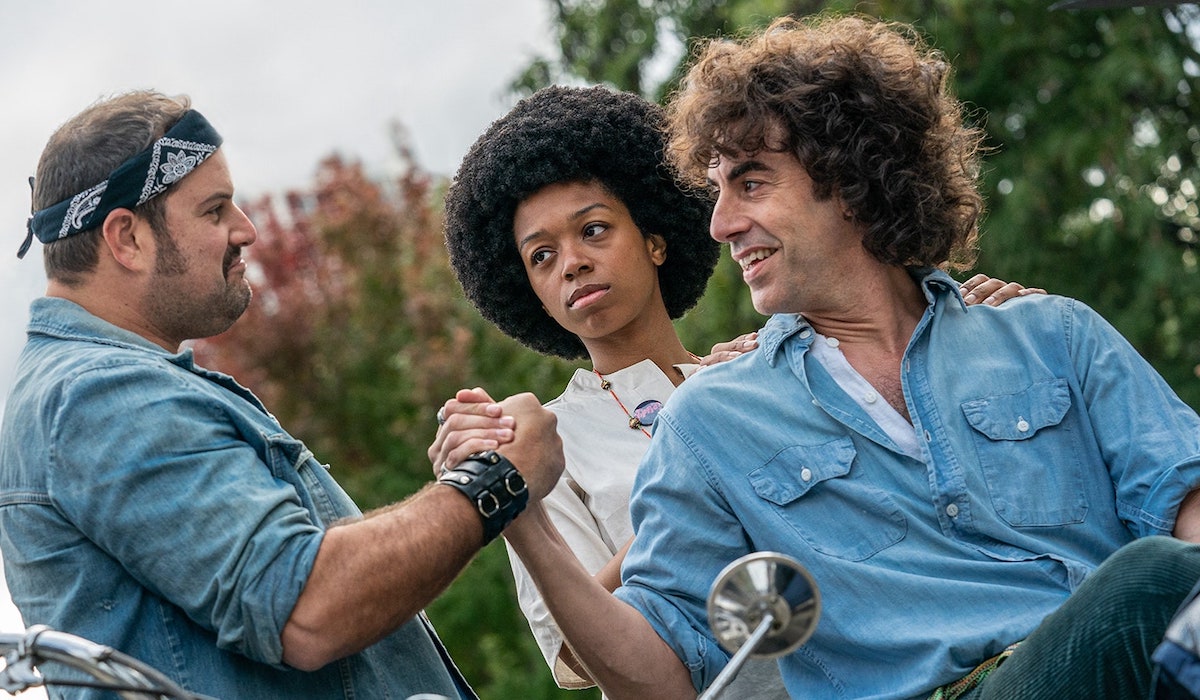Aaron Sorkin’s back at it again with the white politics! The writer has a reputation for the self-righteous, neoliberal speechifying that makes moderates feel comfortable and the right feel justified, and not without reason. His work is littered with moments that are downright embarrassing. The West Wing’s President Bartlet white savior-ing half the world with honey-tongued foreign policy is asinine, given the actual results of U.S. interventionism, and the hackneyed “America was the greatest country in the world” speech from The Newsroom fared even worse: “we cared about our neighbors”? No, we slaughtered our neighbors when we stole the neighborhood. “We built great, big things”? Define “we” and get back to us on that, Sorkin. So with The Trial of the Chicago 7, a script he wrote in 2007, making it to the big screen in 2020, there’s reason to worry that it’s already aged badly.
For those unfamiliar with the Chicago 7: they were a group of loosely related progressives who protested the 1968 Democratic convention before a riot broke out, leaving hundreds tear-gassed and beaten by police. The progressives leading the protests—who varied in degrees they leaned to the left but rallied around a shared desire to end the Vietnam War—were investigated by Lyndon Johnson’s attorney general under suspicion of starting the riot. But after six months of research, his team found overwhelming evidence that the Chicago police were responsible. When Nixon’s administration came to power in 1969, however, the new attorney general immediately moved to charge the Chicago 7 with intent to incite a riot. They were rounded up and put on trial shortly after.
The fact that the epidemic of police violence continues unabated to this day is not lost on Sorkin, who has updated his script to reflect the times. Though Sorkin is infamous for excoriating America only to venerate the broken clock when it’s right twice a day, The Trial of the Chicago 7 gives cops no quarter—they’re the only villains of the story that Sorkin has no interest in humanizing. He even brings that conviction to his directing: by staging his extras carefully and rarely allowing the camera to see cops up close (unless they’re boiling with rage), the police are framed as a homogenous, uncaring, occupying force, or as faceless torture devices befalling the innocent. Sorkin appears to have listened to what the tortured are saying about the police force as a system. One finds oneself pleasantly surprised to have Sorkin telling this story (but mostly because the director was originally meant to be Spielberg—I shudder to imagine.)
The casting director deserves the highest portion of praise, though. The major players are perfect: Sacha Baren Cohen gives his best performance (and most consistent accent) as Yippie revolutionary Abbie Hoffman, the power of Yahya Abdul-Mateen II’s turn as Black Panther Bobby Seale is enough to provoke stunned silence, and Eddie Redmayne’s voice has never been so normally modulated. Perhaps it’s no shock to declare that Mark Rylance embodies his role so well you’d swear he owned a time machine, but it bears repeating.
The ratio of good Sorkin dialogue to bad is favorable, too. For every impossibly snappy comeback or moralizing soliloquy, there are at least two lines that cut to the core of the matter with startling clarity. Using leftist revolutionaries as mouthpieces is relatively new territory for the writer, and his understanding of their ideas is indicative of political growth that we hadn’t seen from him in decades. He ignites still-relevant debates about the place of violence in progressive organizing, the necessity of political theater to the American “justice” system, and the sin of prioritizing electoral politics over the material needs of the suffering. But the script’s greatest success is how Sorkin weakens his own speeches by pitting them against American bureaucracy: on more than one occasion, a character makes an argument that would’ve brought peace to the Middle East in The West Wing, only to be met by judicial blockades so obstinate that all the air is let out of the room and replaced with anger. It’s not self-righteous; it’s righteous fury, and it courses through The Trial of the Chicago 7 like a wildfire.
But Sorkin’s gotta Sorkin, so his biggest blind spot—race—is still a problem. That’s not to say he hasn’t made a stride in that department: the film directs seething anger at the injustices done to Black Panther leaders like Bobby Seale and Fred Hampton. But it’s not enough. The script literally minimizes Black suffering by downplaying the courtroom treatment of Seale, who was bound and gagged for several days as he pleaded for legal representation. In the film, he’s bound and gagged for a few minutes before nice white people come to his rescue. Sorkin’s deficient growth in this area is best encapsulated by his use of a stock character for white directors: the Black maid. At least she gets to fire off an indignant remark before resuming her servantly duties. Progress?
Sorkin’s weak spots unfortunately win out as the film comes to a close. The third act is a disgraceful relapse into his worse tendencies. The score swells to saccharine, optimistic heights, despite all the horror we’ve seen, as Sorkin finds easy paths to redemption for even the most abhorrent and racist characters. The closing moments undermine everything that came before. It’s worse than hack writing—it’s cowardly. It’s the sourest of notes to go out on, but hopefully a teachable moment for Sorkin: he’s never been so close to realizing that the clock is broken all the time.
★★★½ (3.5/5)




